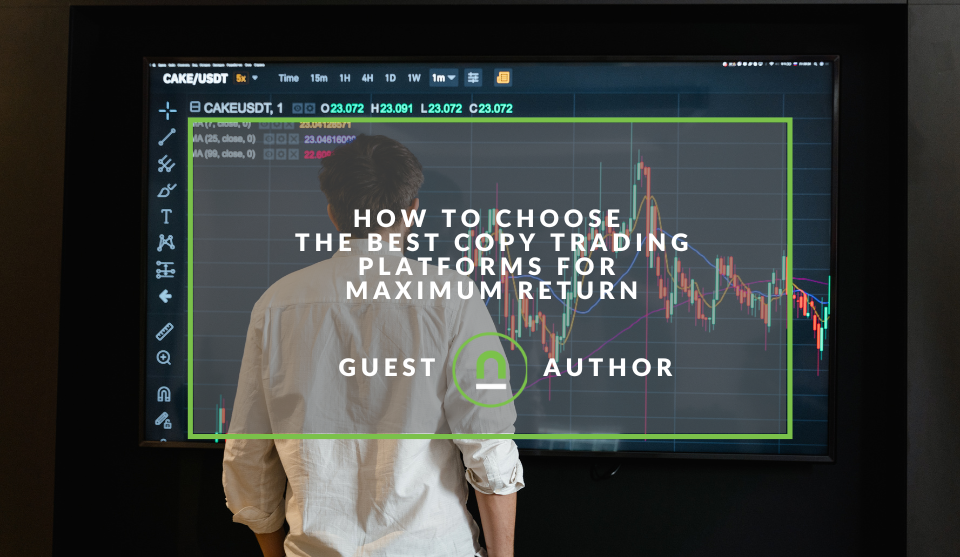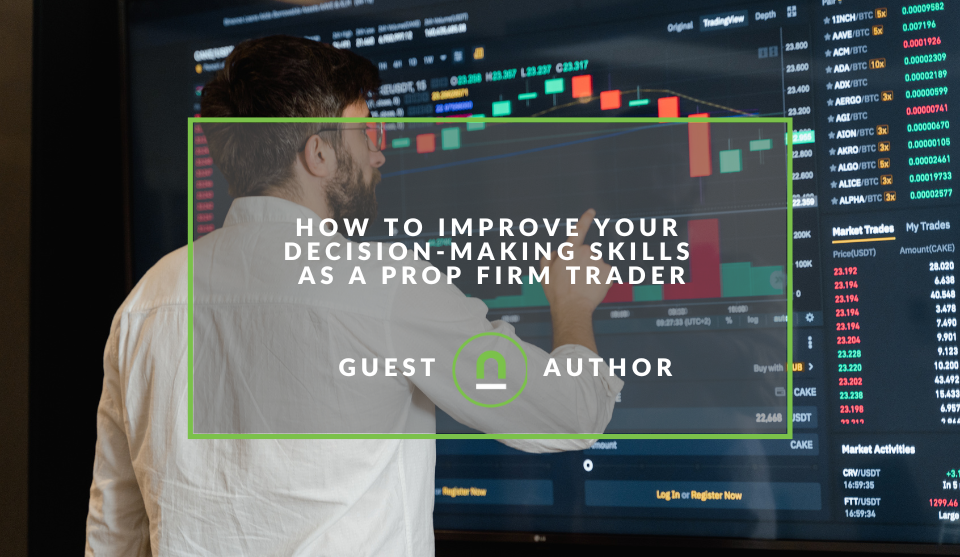Recent posts

Shopaholics
How to Choose A Perfect 2-Seater Couch for Small Spaces
28 February 2025

Money Talks
How Crypto Technology Continues To Revolutionise The Business World
27 February 2025

nichemarket Advice
How to Choose the Best Copy Trading Platforms for Maximum Return
24 February 2025

Mind, Body & Soul
A Guide to Cannabis Seeds in South Africa
21 February 2025
Popular posts
Extravaganza
Trending Music Hashtags To Get Your Posts Noticed
24 August 2018
Geek Chic
How To Fix iPhone/iPad Only Charging In Certain Positions
05 July 2020
Extravaganza
Trending Wedding Hashtags To Get Your Posts Noticed
18 September 2018
Money Talks
How To Find Coupons & Vouchers Online In South Africa
28 March 2019
How to Improve Your Decision-Making Skills as a Prop Firm Trader
02 December 2024 | 0 comments | Posted by Nina Sandic in Money Talks
As a prop firm trader, your success in the market heavily depends on your decision-making skills. Every trade you make, and every position you take requires careful analysis and evaluation. In this article, we will explore the importance of decision-making in prop trading and provide practical tips to enhance your decision-making abilities.
Understanding the Importance of Decision-Making in Prop Trading
Decision-making is at the core of prop trading success. Your ability to make timely and accurate decisions can significantly affect your profitability.
The outcome of each trade ultimately rests on your choices. Therefore, it is crucial to develop a robust decision-making framework to navigate the complex and dynamic market environment.
The Role of Decision-Making in Trading Success
Effective decision-making is the key to trading success. Every trade involves various factors, such as market conditions, news events, technical indicators, and risk parameters.
It is the trader's responsibility to evaluate and synthesize these variables to make informed trading decisions.
A well-executed decision can open doors to profitable opportunities, while a poor decision can lead to significant losses.
Key Factors Influencing Trading Decisions
Several factors influence your trading decisions, whether you're an individual investor or a trader at a leading proprietary trading firm like RebelsFunding. These include market analysis, risk appetite, trading goals, and psychological factors.
Market analysis involves evaluating technical and fundamental indicators to identify potential trade setups. Your risk appetite determines the size of your positions and the extent of risk you are willing to tolerate.
Your trading goals guide your decision-making process as they define what you aim to achieve in the market. Lastly, your psychological state, including emotions and biases, can significantly impact your decision-making abilities.
When it comes to market analysis, traders employ a wide range of tools and techniques to gain insights into the market's behaviour.
What Goes Into Technical Analysis?
Technical analysis, for example, involves studying price patterns, trends, and support and resistance levels to identify potential entry and exit points.
Fundamental analysis, on the other hand, focuses on evaluating the underlying factors that can impact the value of a financial instrument, such as economic indicators, company financials, and geopolitical events. Having a clear understanding of your risk appetite is essential in prop trading.
It helps you determine the appropriate position size for each trade and establish risk management strategies to protect your capital. Some traders prefer a conservative approach, limiting their risk exposure to a small percentage of their trading capital, while others may be more aggressive and willing to take on higher levels of risk for potentially greater rewards.
Furthermore, setting clear trading goals is crucial for effective decision-making. Your goals serve as a roadmap, guiding your actions and helping you stay focused on your goals.
Whether it's generating consistent profits, building long-term wealth, or mastering a specific trading strategy, having well-defined goals provides a sense of direction and purpose in your decision-making process.
Lastly, understanding and managing your psychological state is vital in prop trading. Emotions such as fear and greed can cloud your judgment and lead to impulsive and irrational decisions.
It is essential to develop emotional discipline and cultivate a mindset that allows you to stay calm and objective, even in the face of market volatility or unexpected events. Recognizing your biases and being aware of how they can influence your decision-making can also help you make more rational and informed choices.
Developing a Robust Trading Strategy
Having a well-defined trading strategy is essential for consistent long-term success in prop trading.
A trading strategy provides a clear structure for your decision-making process, ensuring that you do not make impulsive or emotionally driven trades.
Importance of a Well-Defined Trading Plan
A well-defined trading plan serves as the foundation of your trading strategy. It outlines your trading goals, risk management rules, entry and exit criteria, and overall approach to the market.
Having a plan in place better equips you to handle various market scenarios and make objective decisions.
A trading plan also helps you track your performance and identify areas for improvement.
Steps to Formulate an Effective Trading Strategy
Formulating an effective trading strategy involves several steps. It starts with identifying your trading goals and assessing your risk tolerance.
Next, you need to conduct thorough market research and analysis to identify potential trading opportunities and develop a systematic approach.
You should also define your risk management rules to protect your capital and minimize losses. Lastly, it is crucial to backtest and refine your strategy based on historical market data to ensure its effectiveness.
Enhancing Your Analytical Skills
Analytical skills are essential for prop traders to interpret market data effectively and make informed decisions.
Importance of Market Analysis in Trading
Market analysis involves studying various market factors, including price patterns, trends, news events, and macroeconomic indicators.
It helps traders gain insights into market movements and make predictions about future price movements.
By analyzing market data, you can identify potential opportunities and devise trading strategies accordingly.
Tools and Techniques for Better Market Analysis
There are various tools and techniques available to enhance your market analysis capabilities.
These include technical analysis tools, such as moving averages and indicators, which help identify patterns and trends in price data.
Fundamental analysis involves analyzing economic indicators, company financials, and geopolitical events to assess the value and potential growth of an asset.
Additionally, staying updated with market news and using advanced trading platforms can provide valuable insights and improve your decision-making abilities.
Managing Risk and Uncertainty in Prop Trading
Risk management is a fundamental aspect of prop trading. It involves identifying potential risks and implementing strategies to mitigate them.
Understanding Risk Management in Trading
Risk management involves assessing and controlling the potential risks associated with trading activities.
It includes determining the optimum position size, setting stop-loss orders, diversifying your portfolio, and managing leverage.
Effective risk management helps protect your capital and minimizes the impact of market volatility on your trading account.
Techniques for Effective Risk Management
There are several techniques you can employ to enhance risk management in prop trading.
These include setting a maximum risk per trade based on your risk appetite, using trailing stops to protect profits, regularly reviewing and adjusting your risk management strategies, and maintaining a disciplined approach to trading.
Additionally, having a well-diversified portfolio can help spread risk across different assets or markets.
Embracing Emotional Intelligence in Trading
Emotional intelligence plays a crucial role in prop trading, as it helps traders manage their emotions and make rational decisions.
The Impact of Emotions on Trading Decisions
Emotions can significantly influence trading decisions, often leading to impulsive and irrational actions.
Fear and greed are commonly experienced emotions in trading, which can cloud judgment and result in poor decision-making.
Developing emotional intelligence helps you recognize and manage these emotions effectively, enabling you to make rational and objective trading decisions.
Strategies to Improve Emotional Intelligence in Trading
Improving emotional intelligence requires self-awareness and practice.
Strategies to enhance emotional intelligence in prop trading include developing a trading routine, maintaining a balanced lifestyle, practising mindfulness and meditation, and seeking support from fellow traders or mentors.
Additionally, continuously analyzing and learning from your trading experiences can help identify patterns of behaviour influenced by emotions and allow you to make necessary adjustments.
Improving your decision-making skills as a prop firm trader is a continuous process that requires dedication and a commitment to self-improvement.
By understanding the importance of decision-making, developing a robust trading strategy, enhancing your analytical skills, managing risk effectively, and embracing emotional intelligence, you can set yourself on the path to becoming a successful trader in the competitive prop trading industry.
Tell us your story
Would you like to write for a nichemarket just like Jonathan does? Find out how to submit a guest post, and when you're ready, you can contact us.
Do you need financial help?
Find a financial advisor or financial consultant in your area
Get started with nichemarket
If you are a financial adviser and would like more leads, why not list your business with nichemarket?
Registering with nichemarket is easy; all you will need to do is head over to our sign-up form and follow the instructions. If you require a more detailed guide on how to create your profile or your listing, then we highly recommend you check out the following articles.
Recommended reading
If you enjoyed this post and have the time to spend diving deeper down the rabbit hole, then we suggest you check out the following posts about improving your finances in South Africa.
- What Is A Money Market Account?
- Ways To Earn Cryptocurrency
- How To Passively Earn Cryptocurrency
- Types Of Cryptocurrency Exchanges
- How South Africans Can Buy Bitcoin
Disclaimer: This is not investment advice and is for informational purposes only. nichemarket cannot be held liable for any investment decisions made based on the information given by independent financial service providers. Under the ECT Act and to the fullest extent possible under the applicable law, nichemarket disclaims all responsibility or liability for any damages whatsoever resulting from the use of this site in any manner.
Tags: Trading, Investing, Guest Post
You might also like
How to Choose the Best Copy Trading Platforms for Maximum Return
24 February 2025
Posted by Cornelia Ekong in nichemarket Advice
How to select a copy trading platform by evaluating key features, trader performance, risk management tools, and costs to maximize your investment re...
Read moreHow to Choose A Perfect 2-Seater Couch for Small Spaces
28 February 2025
Posted by Candice Reed in Shopaholics
Are you struggling with choosing a perfect 2-seater couch for your small space? Learn how you can find the one that perfectly aligns with your choice...
Read more{{comment.sUserName}}
{{comment.iDayLastEdit}} day ago
{{comment.iDayLastEdit}} days ago
 {{blogcategory.sCategoryName}}
{{blogcategory.sCategoryName}}
